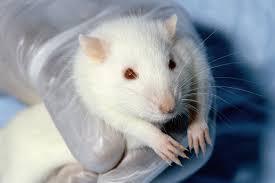Israeli science used 6% more animals in testing last year
Tests were performed on around 48,000 rats, 888 guinea pigs, 1,482 rabbits, 21,775 chickens, 4,239 turkeys, 238 sparrows, 1,057 head of cattle, 405 goats, 12 horses, 87 bats and 745 frogs — though other animals were used as well. Also, about half the tests involved a high level of suffering; 12 percent involved ongoing suffering in which the animals received no painkillers — a 20-percent increase over 2012. For example, 90 percent of tests on monkeys fit this category. In the experiments, only 2,339 animals were returned to the blocks and 156 were released back into nature.
About 80 percent of animal experiments were done at universities and research institutes in basic research. Ten percent of the tests were carried out at biotechnology and pharmaceutical firms. Animals were also used for teaching anatomy and the life sciences in general. Israel prohibits animal testing for cosmetics.
The Knesset Education Committee is expected to discuss animal experimentation on Tuesday; animal-defense groups are not happy with the statistics. A bill crafted by MK Dov Khenin (Hadash) will be discussed; the legislation contains three main demands: a neutral party on the Council for Experiments on Animals not involved in animal testing, three officials from animal-defense groups on the council, and an outside veterinarian on every committee at an institution doing animal testing.
All told, animals were used in 2,530 tests last year, not including the defense sector.
Ido Efrati

